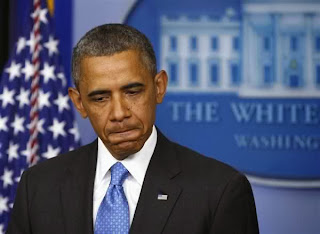Larry Downing / Reuters
President Barack Obama speaks about the Trayvon Martin case in the press briefing room at the White House in Washington, July 19, 2013.
By Michael O'Brien, Political Reporter, NBC News
President Barack Obama made a surprise appearance at the White House Friday to discuss African-Americans' reaction to last weekend's verdict in the George Zimmerman case, saying that "Trayvon Martin could have been me 35 years ago."
"You know, when Trayvon Martin was first shot, I said that this could have been my son. Another way of saying that is Trayvon Martin could have been me 35 years ago. And when you think about why, in the African- American community at least, there's a lot of pain around what happened here, I think it's important to recognize that the African- American community is looking at this issue through a set of experiences and a history that -- that doesn't go away," he said.

Obama: 'African American boys are painted with a broad brush'
Making a surprise appearance in the White House press room, President Obama discusses his views on the Trayvon Martin verdict, and how it feels as an African American to have these "inescapable" experiences.
Obama addressed the issue personally as well, saying, "There are very few African-American men in this country who haven't had the experience of being followed when they are shopping at a department store. And that includes me."
He recalled his own experiences before becoming a nationally-recognized politician, noting, "There are very few African- American men who haven't had the experience of walking across the street and hearing the locks click on the doors of cars. That happens to me, at least before I was a senator. There are very few African-Americans who haven't had the experience of getting on an elevator and a woman clutching her purse nervously and holding her breath until she had a chance to get off."
And he contended that these attitudes often shape perceptions in the United States.
"I don't want to exaggerate this, but those sets of experiences inform how the African-American community interprets what happened one night in Florida and it's inescapable for people to bring those experiences to bear," he said.
Asked if the president had thoroughly contemplated his remarks, White House Press Secretary Jay Carney said, "I don't think there's any question, and you can judge by what he just said and how he said it, he knows what he thinks and he knows what he feels, and he had not just in the past week but for a good portion of his life given a lot of thought to these issues."
Obama also suggested that the outcome of the case could have been different if Martin were white. "If a white male teen would have been involved in this scenario," he said, "both the outcome and the aftermath might have been different."
The president also nodded to the Justice Department investigation which is probing whether or not to bring federal civil rights charges against Zimmerman. But Obama also urged state and local officials to review their own procedures to see how to improve their law enforcement practices.
He also called for a review of so-called "Stand Your Ground" laws, a central issue in the case.
"If Trayvon Martin was of age and was armed, could he have stood his ground on that sidewalk?" Obama asked. "If the answer to that question is at least ambiguous, then it seems to me that we should examine those laws."
Obama said he wanted to "reiterate what I said on Sunday, which is there are going to be a lot of arguments about the legal issues in the case. I'll let all the legal analysts and talking heads address those issues."

Obama: 'Trayvon Martin could have been me 35-years ago'
In his first public remarks after the acquittal by a Florida court of Travyon Martin's shooter, George Zimmerman, President Obama says, "Trayvon Martin could have been me, 35 years ago."
The president added, "The judge conducted the trial in a professional manner. The prosecution and the defense made their arguments. The jurors were properly instructed that in a case such as this, reasonable doubt was relevant and they rendered a verdict. And once the jury's spoken, that's how our system works."
And though Obama sidestepped the idea of demanding a new, national conversation on race -- and while he said that racism was far from eliminated -- the president ended on an upbeat moment, expressing his view that race relations are "getting better."
"I don't want us to lose sight that things are getting better. Each successive generation seems to be making progress in changing attitudes when it comes to race. I doesn't mean that we're in a post racial society. It doesn't mean that racism is eliminated," he said. "But you know, when I talk to Malia and Sasha and I listen to their friends and I see them interact, they're better than we are."
Obama added: "We have to be vigilant and we have to work on these issues, and those of us in authority should be doing everything we can to encourage the better angels of our nature as opposed to using these episodes to heighten divisions. But we should also have confidence that kids these days I think have more sense than we did back then, and certainly more than our parents did or our grandparents did, and that along this long, difficult journey, we're becoming a more perfect union -- not a perfect union, but a more perfect union."
This story was originally published on Fri Jul 19, 2013 1:46 PM EDT
14070comments
top stories
M
Sent from my BlackBerry wireless device from MTN





















No comments:
Post a Comment